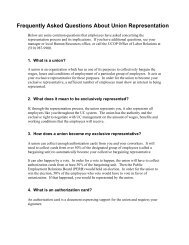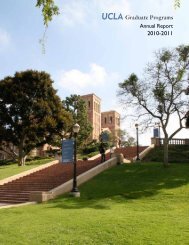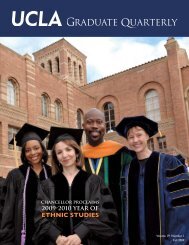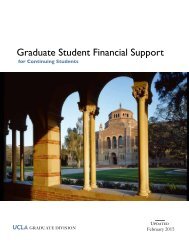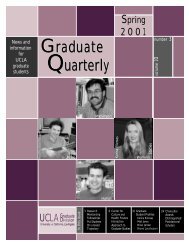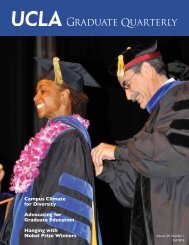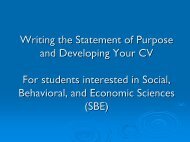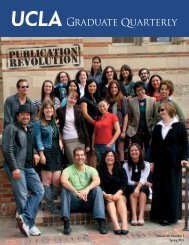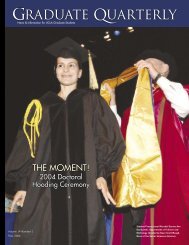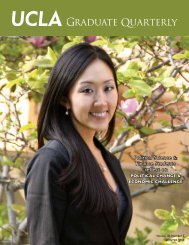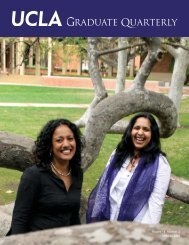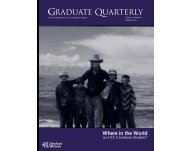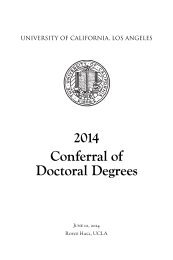Graduate Quarterly - Winter 2008 - UCLA Graduate Division
Graduate Quarterly - Winter 2008 - UCLA Graduate Division
Graduate Quarterly - Winter 2008 - UCLA Graduate Division
You also want an ePaper? Increase the reach of your titles
YUMPU automatically turns print PDFs into web optimized ePapers that Google loves.
The load that Greg is helping to carry<br />
involves developing a variety of ways to measure<br />
the environmental impact of municipal<br />
operations, from the carbon efficiency of energy<br />
generation to the amount of electricity<br />
used to transport fresh water from Northern<br />
California to Los Angeles.<br />
Like Greg, Chad Finlay had an internship<br />
that helped to shape his interests. Though he<br />
arrived thinking he might like to work in an<br />
area involving foster care or adoption, his internship<br />
put him in the office of Los Angeles<br />
School Board member Marlene Canter. He<br />
is enjoying his work examining new assessment<br />
tools in the Los Angeles Unified School<br />
District and hopes to get a related job.<br />
An undergraduate biology major, Josh<br />
Mukhopadhyay, figured he would eventually<br />
move in the direction of scientific research.<br />
Instead, he chose the joint degree program<br />
between public policy and the law school,<br />
and he has a job with an Oakland law firm<br />
specializing in economic development, with<br />
an emphasis on affordable housing. Because<br />
he was at <strong>UCLA</strong> longer than the others, he<br />
had the opportunity to pursue a variety of<br />
internships and volunteer experiences.<br />
Working in the “real world” provides<br />
important benefits for public policy students.<br />
First of all, you get to meet a lot of interesting<br />
people. Assigned to the mayor’s chief of<br />
staff, whose responsibilities cross many areas,<br />
Greg Spotts got to meet “a ton of people,” he<br />
says. Having come to <strong>UCLA</strong> to build a web<br />
of connections to local government, he says, “I<br />
couldn’t have written a more perfect script.”<br />
Meeting people in powerful positions,<br />
Nurit Katz learned something about her<br />
own potential. “The more you get to interact<br />
with people in leadership positions, the<br />
more you realize they are ordinary people,<br />
the more you recognize that you can have a<br />
real impact,” she says. “I’ve definitely gotten<br />
inspired by the impact you can have in<br />
a policy position.” As a result of her experiences<br />
in the program, she decided to run for<br />
president of the <strong>UCLA</strong> <strong>Graduate</strong> Students<br />
Association, and she was elected to serve<br />
for the 2007-<strong>2008</strong> term, representing more<br />
than 11,000 graduate students.<br />
Practical experience also helps students<br />
understand and prepare for the challenges they<br />
Chad Finlay<br />
BA, philosophy and English, Wheaton College<br />
Final project: <br />
assessment tools adopted<br />
Previous experience: <br />
“I was at a point in my career where I was ready for a next step. I was itching to get more in<br />
the mix of policy formation and implementation.”<br />
may face in public policy jobs. For example,<br />
Chad Finlay saw that it was important to<br />
evaluate not only the LAUSD’s new assessment<br />
tools but also the challenges the school board<br />
might face in getting members of the school<br />
community to buy into them. “At the end of<br />
the day, the most important thing is getting it<br />
done,” he says, noting the frequent gap between<br />
what research shows is desirable and what ends<br />
up being implemented. “What’s interesting to<br />
me is to try to bridge that gap.”<br />
Professor Carnesale would say Chad has<br />
hit on a key point. Programs in public policy<br />
are successful in large part because they’re<br />
not conducted in the proverbial ivory<br />
tower, the former chancellor says. “People<br />
here are bringing the most sophisticated<br />
methodologies to bear on public problems,”<br />
he says, “but they’re real problems,<br />
not idealized problems and not idealized<br />
solutions. I have always told my students<br />
that an optimum policy that cannot be<br />
implemented `ain’t’ optimum. It’s important<br />
not only to explore the ideal but also<br />
to determine what’s the best that can be<br />
done in the real world.”<br />
<strong>Winter</strong> <strong>2008</strong> GRADUATE QUARTERLY<br />
9



